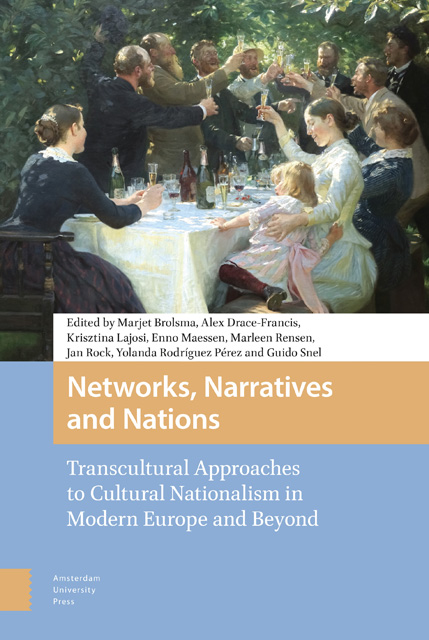 Networks, Narratives and Nations
Networks, Narratives and Nations Book contents
8 - A Dutch Journal with a European Programme: DeMuzen
Published online by Cambridge University Press: 16 November 2022
Summary
Abstract
The Dutch literary journal De Muzen (The Muses, 1834–35; originally meant to be titled Europa) aimed at enhancing the level of literary criticism and of literature itself by drawing attention to international literature both modern and classic. It was to become the first in the Netherlands to publish full-fledged reviews, informative and comparative but also critical. Due to the premature death of the journal's founder, Aarnout Drost, it came to an end after only six volumes. Even so, it gave rise to the establishment of the main cultural journal of the nineteenth century, De Gids (The Guide, 1837–present).
Keywords: Aarnout Drost; De Muzen; nationalism; internationalism; literary criticism; Everhardus Potgieter
Historians have often characterized Dutch nineteenth-century nationalism as constrictive. It allegedly induced a sense of self-sufficiency, causing the nation to erect fences behind which to protect itself against foreign influences. One of the most salient and significant findings to have emerged from Joep Leerssen's numerous works is how international nineteenth-century nationalism really was. Everywhere in Europe a search was going on for what was characteristic of the nation, but always in close connection with the particularities of neighbouring or far-away regions. The whole point was to discover the cultural variety proper to one's own nation through the process of comparing it with other cultures. This is how the paradox of international nationalism comes about.
The paradox is clearly present in the first journal in the Netherlands that aimed to improve the level of Dutch criticism and literature by means of international comparison. Remarkably enough, the first title chosen for this journal with its ambitious European program was Europa, and yet even before the first volume came out the editors switched to De Muzen.
The Journal Established
The occasion for founding De Muzen (The Muses) was a conflict in the journal De Vriend des Vaderlands (The Fatherland's Friend), where since early 1833 a few young and ambitious authors had formed an opposing alliance. When this conflict proved unresolvable, its co-editor Jan Pieter Heije looked around for a publisher willing to give these youngsters a chance with a journal of their own. A well-known Amsterdam publisher, M. Westerman, proved ready to invest in the project.
- Type
- Chapter
- Information
- Networks, Narratives and NationsTranscultural Approaches to Cultural Nationalism in Modern Europe and Beyond, pp. 105 - 114Publisher: Amsterdam University PressPrint publication year: 2022


